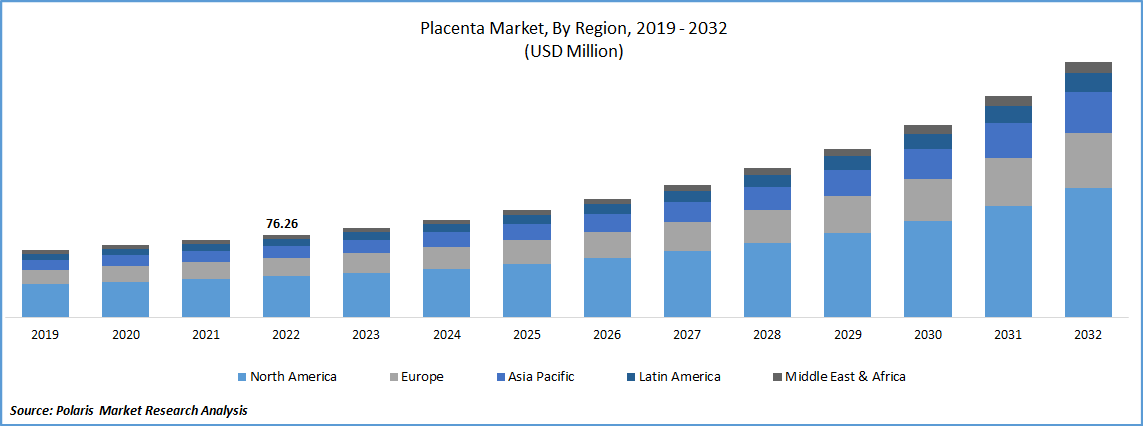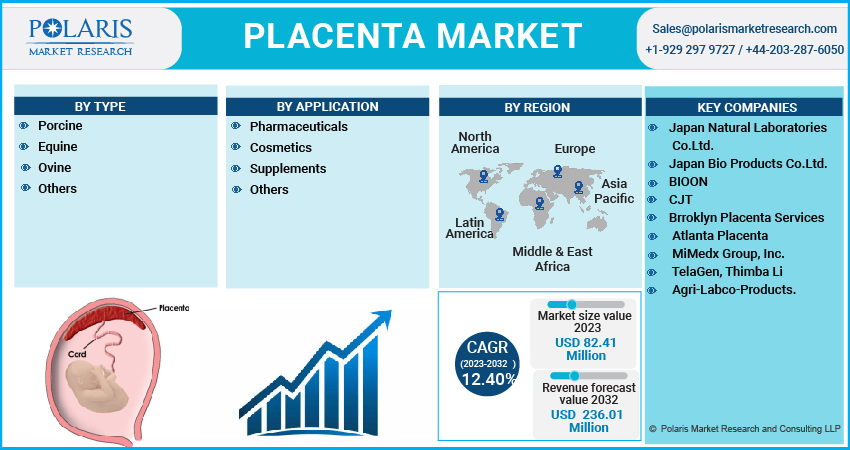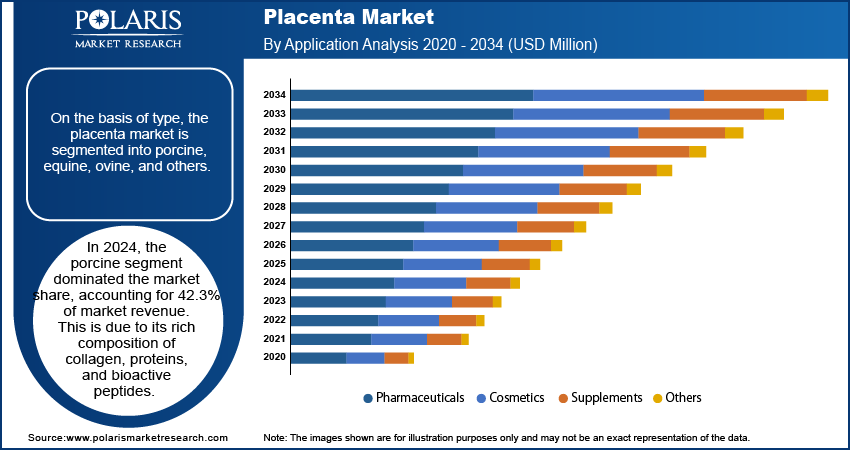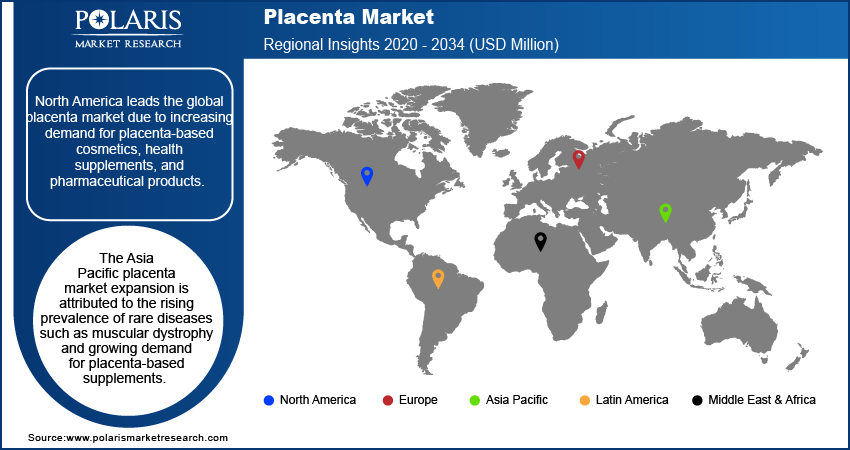
Placenta Market Size, Share, Trends, Industry Analysis Report: By Type (Porcine, Equine, Ovine, and Others), Application, and Region (North America, Europe, Asia Pacific, Middle East & Africa, and Latin America) – Market Forecast, 2025–2034
- Published Date:May-2025
- Pages: 113
- Format: PDF
- Report ID: PM3162
- Base Year: 2024
- Historical Data: 2020-2023
Placenta Market Overview
The global placenta market size was valued at USD 599.45 million in 2024. The market is projected to grow from USD 652.21 million in 2025 to USD 1,404.87 million by 2034, exhibiting a CAGR of 8.9% during 2025–2034.
The placenta, an organ that develops during pregnancy to provide oxygen and nutrients to the growing fetus, has gained significant attention in the medical and cosmetic industries. Placenta-derived products are extensively used in antiaging skincare due to their bioactive compounds, which aid in skin rejuvenation, enhance elasticity, and diminish wrinkles. The growing demand for these benefits has driven significant research and innovation, contributing to the market expansion. Many cosmetic brands now incorporate placental extracts into their products, further propelling the market growth.
The popularity of placenta-based hair care solutions is rising, as these products strengthen hair follicles, reduce hair loss, and promote new growth. More consumers are seeking scientifically backed, natural remedies. Thus, companies are investing in placenta-based formulations, leading to a steady increase in placenta market demand. Brands such as MZ Skin and Laennec use placenta extracts in their skincare and hair care products to improve results. Therefore, the market is growing steadily, with new products such as placenta-infused serums and shampoos becoming popular among consumers looking for high-quality, science-backed beauty solutions.

To Understand More About this Research: Request a Free Sample Report
Research indicates that individuals experiencing alopecia areata or hereditary hair thinning benefit from treatments containing placental extracts, which provide essential nutrients to the scalp and improve blood circulation. According to NAAF, alopecia areata affects approximately 2% of the global population, including 7 million individuals in the US, which further strengthens the demand for such innovations. Individuals experiencing hair thinning or premature skin aging due to conditions such as alopecia seek advanced treatments, pushing manufacturers to develop more potent placenta-infused products.
Placenta Market Dynamics
Expanding Applications in Regenerative Medicine and Wound Healing
Placenta is increasingly used in regenerative medicine and wound healing applications, particularly in chronic wounds, burns, and orthopedic conditions. Placental-derived biologics, including amniotic membrane products, placental stem cells, and extracellular matrix components, have demonstrated exceptional efficacy in accelerating tissue regeneration, reducing inflammation, and enhancing angiogenesis. These properties make placenta-based products highly valuable for applications where conventional treatments, such as skin grafts or synthetic biologics, show limited success. In chronic wound management, the rising incidence of diabetic foot ulcers (DFUs), venous leg ulcers (VLUs), and pressure ulcers (PUs) fuels demand for placental allografts. According to the article published by MDPI, a publisher of open access journals over 25% of DFU cases lead to lower limb amputation if left untreated, thus, increasing the need for advanced wound care solutions. Products such as EpiFix (MiMedx), Affinity (Organogenesis), and AmnioBand (MTF Biologics) have gained significant market traction as they promote faster wound closure and reduce infection risks. These placental-derived wound dressings provide anti-inflammatory cytokines, growth factors, and extracellular matrix proteins, which collectively enhance epithelialization. Owing to all these benefits, hospitals, specialty wound care centers, and outpatient clinics are increasingly integrating placental biologics into standard treatment protocols. Hence, expanding applications of placenta-derived biologics in regenerative medicine and wound healing are propelling the placenta market growth.
Growing Placenta-Derived Biopharmaceutical Innovations
The placenta market is experiencing rapid growth as the biopharmaceutical industry invests in placental-derived therapeutics for advanced medical treatments. With its rich source of stem cells and bioactive molecules, the placenta is playing a crucial role in developing next-generation biologics. One of the key placenta market trends is the increasing focus on autoimmune diseases, neurological disorders, and oncology, where placental stem cell therapies show strong potential.
Companies such as Pluristem Therapeutics and Celularity are developing innovative treatments for conditions such as Parkinson’s disease, stroke recovery, and Crohn’s disease. The US FDA’s support through regenerative medicine advanced therapy (RMAT) designations is accelerating regulatory approval and commercialization, creating new placenta market opportunities. For example, Pluristem’s PLX-PAD is in clinical trials for muscle regeneration and critical limb ischemia, while Celularity’s CYNK-001 is being tested for multiple myeloma and glioblastoma. The growing adoption of placental MSC-based therapies highlights the increasing market demand, with pharmaceutical companies recognizing its long-term potential.

Placenta Market Segment Insights
Placenta Market Outlook by Type Insights
In terms of type, the placenta market is segmented into porcine, equine, ovine, and others. In 2024, the porcine segment dominated the placenta market share and is anticipated to grow faster over the forecast period. This growth is attributed to the versatility and availability of porcine placenta. Porcine (pig) placenta is emerging as a valuable resource in the market, owing to its rich composition of collagen, proteins, and bioactive peptides. The increasing use of porcine placenta in skincare and hair rejuvenation has driven placenta demand, with research highlighting its effectiveness in promoting skin cell regeneration and hair growth. A 2022 study published on NCBI demonstrated the benefits of porcine placenta extract in nano-transdermal formulations, reinforcing its potential for treating alopecia and enhancing skincare products.
Beyond cosmetics, the biomedical field is exploring porcine placenta for wound healing and regenerative medicine, contributing to market expansion. Additionally, its application in bioactive supplements is gaining attention as consumers seek natural solutions for overall health. As more industries integrate porcine placenta into their products, the market continues to grow. With ongoing research and increasing consumer interest, the porcine placenta segment is expected to play a significant role in shaping the global placenta market trends.
Placenta Market Assessment by Application Insights
By application, the placenta market is segmented into pharmaceuticals, cosmetics, supplements, and others. The pharmaceuticals segment accounted for the largest share in 2024 and is expected to register a CAGR of 8.9% during the forecast period. In the pharmaceutical segment, placental extracts have been explored for their therapeutic properties. Placenta-based pharmaceuticals have been investigated for their potential in regenerative medicine, wound healing, and immune modulation. The rich composition of bioactive molecules such as growth factors, cytokines, and extracellular vesicles makes placental extracts promising candidates for therapeutic applications.
Placental extracts have shown significant benefits in post-operative wound care and burn treatments by accelerating tissue repair. In Japan, injectable placental extract therapies are widely used for liver diseases and chronic fatigue syndrome, highlighting their clinical versatility. With over 6.7 million people in the US suffering from chronic non-healing wounds, the placenta market opportunity in advanced wound management is growing. More medical professionals recognize placental extracts as an effective alternative to conventional treatments; thus, the market revenue is expected to rise.

Placenta Market Regional Analysis
By region, the study provides placenta market insights into North America, Europe, Asia Pacific, the Middle East & Africa, and Latin America. The North America placenta market size reached USD 207.89 million in 2024 and is estimated to register a CAGR of 8.9% during the forecast period. The market is experiencing significant growth due to the increasing demand for placenta-based cosmetics, health supplements, and pharmaceutical products. In North America, the rise in placenta demand is largely driven by growing disposable income and increasing awareness of the health and skincare benefits of placental extracts. According to the Federal Reserve Bank of St. Louis, disposable income in the US increased from USD 48,534 in 2022 to USD 51,491 in 2024, enabling consumers to spend more on biocosmetics, health supplements, and pharmaceutical products.
The shift toward natural and organic skincare solutions is another major factor influencing placenta market trends, as more consumers seek alternatives to synthetic chemicals. According to the American Chemical Society, 40% of US consumers now prefer natural materials over synthetic ingredients in cosmetics, boosting market growth. Similarly, in the health supplement industry, placenta-based formulations are becoming popular for their potential to enhance immunity. The rising demand for bioactive compounds propels the North American placenta market expansion.
The Asia Pacifici placenta market is expected to register a significant CAGR from 2025 to 2034. The regional market growth is driven by the rising prevalence of rare diseases such as muscular dystrophy and growing demand for placenta-based supplements. Muscular dystrophy, a rare genetic disorder that weakens muscles over time, has seen increasing cases in several Asia Pacific countries. According to the Parent Project Muscular Dystrophy, India alone boasts 327 cases of Duchenne muscular dystrophy in the last 15 years, representing 6% of total cases worldwide. Placenta-derived therapies are gaining attention for their potential in regenerative medicine, particularly for treating conditions where conventional therapies have limited success. This, in turn, is driving the market demand in this region.

Placenta Market – Key Players & Competitive Insights
The placenta market comprises a diverse range of companies engaged in the development, processing, and commercialization of placental-derived products for medical, pharmaceutical, and cosmetic applications. Established players such as Japan Natural Laboratories Co., Ltd. and Japan Bio Products Co., Ltd. have long been involved in placental extract research and therapeutic formulations. Firms such as MIMEDX Group, Inc. focus on placental tissue-based regenerative medicine and wound care solutions. The market also includes specialized encapsulation service providers such as Atlanta Placenta Encapsulation, The Placenta Company, and Mommy Made Encapsulation, across postpartum recovery and wellness applications.
A few major players in the placenta market include Japan Natural Laboratories Co., Ltd.; Japan Bio Products Co., Ltd.; Albert David Limited; Atlanta Placenta Encapsulation; MIMEDX Group, Inc.; PURTIER Placenta; The Placenta Company; Smith and Nephew; Mommy Made Encapsulation; and Nubloom LLC.
Japan Natural Laboratories Co., Ltd. is engaged in the manufacture, sale, import, and export of quasi-drugs, cosmetics, and health foods. The company specializes in these products, leveraging expertise in pharmaceutical and cosmetic manufacturing. It was founded in 1996, and its headquarters are located in Nakano-ku, Tokyo. The company's product portfolio includes a range of cosmetics and health foods, while its services encompass manufacturing, sales, and distribution of these products. Japan Natural Laboratories Co., Ltd. has a presence in Japan and also exports its products to other countries, serving both domestic and international markets.
Japan Bio Products Co., Ltd. is engaged in the research, development, manufacturing, and distribution of pharmaceutical, cosmetic, and healthcare products derived from human placental extracts. The company focuses on utilizing bioactive components of the placenta for medical and aesthetic applications. Japan Bio Products Co., Ltd.'s product portfolio includes Laennec, a human placental extract injection used for liver function improvement; Melsmon, a placental-derived injection for menopausal symptoms; and Curacen, a specialized formulation for aesthetic treatments. The company's international operations support the distribution of its products to healthcare institutions, aesthetic clinics, and pharmaceutical markets across multiple countries. The company continues to focus on research-driven advancements in placental therapy while maintaining regulatory compliance in different markets.
List of Key Companies in Placenta Market
- Albert David Limited
- Atlanta Placenta Encapsulation
- Japan Bio Products Co., Ltd.
- Japan Natural Laboratories Co., Ltd.
- MIMEDX Group, Inc.
- Mommy Made Encapsulation
- Nubloom LLC
- PURTIER Placenta
- Smith and Nephew
- The Placenta Company
Placenta Industry Developments
March 2024: MiMedx Group, Inc. signed an agreement with TELA Bio, Inc. to secure exclusive rights to a manufacturing and supply deal with Regenity Biosciences. This allows MiMedx to add xenograft products to its Advanced Wound Care and Surgical solutions portfolio.
May 2023: Japan Biologics Co., Ltd.(JBP) collaborated with ONODERA Medical Co., Ltd. on research regarding stem cell regeneration using human placental tissue.
June 2022: MIMEDX partnered with Nordic Bioscience Clinical Development A/S to advance its registrational trials for a placental-derived injectable biologic targeting knee osteoarthritis. This collaboration aims to accelerate the clinical development process and facilitate regulatory approval for this innovative treatment option.
Placenta Market Segmentation
By Type Outlook (Revenue, USD Million, 2020–2034)
- Porcine
- Equine
- Ovine
- Others
By Application Outlook (Revenue, USD Million, 2020–2034)
- Pharmaceuticals
- Cosmetics
- Supplements
- Others
By Regional Outlook (Revenue, USD Million, 2020–2034)
- North America
- US
- Canada
- Mexico
- Europe
- Germany
- France
- UK
- Russia
- Italy
- Spain
- Netherlands
- Rest of Europe
- Asia Pacific
- China
- Japan
- India
- Malaysia
- South Korea
- Indonesia
- Rest of Asia Pacific
- Middle East & Africa
- Saudi Arabia
- Israel
- UAE
- Rest of Middle East & Africa
- Latin America
- Brazil
- Mexico
- Argentina
- Rest of Latin America
Placenta Market Report Scope
|
Report Attributes |
Details |
|
Market Size Value in 2024 |
USD 599.45 Million |
|
Market Size Value in 2025 |
USD 652.21 Million |
|
Revenue Forecast by 2034 |
USD 1,404.87 Million |
|
CAGR |
8.9% from 2025 to 2034 |
|
Base Year |
2024 |
|
Historical Data |
2020–2023 |
|
Forecast Period |
2025–2034 |
|
Quantitative Units |
Revenue in USD Million and CAGR from 2025 to 2034 |
|
Report Coverage |
Revenue Forecast, Market Competitive Landscape, Growth Factors, and Industry Trends |
|
Segments Covered |
|
|
Regional Scope |
|
|
Competitive Landscape |
|
|
Report Format |
|
|
Customization |
Report customization as per your requirements with respect to countries, regions, and segmentation. |
FAQ's
The global market size was valued at USD 599.45 million in 2024 and is projected to grow to USD 1,404.87 million by 2034.
The global market is expected to register a CAGR of 8.9% during the forecast period
North America held the largest share of the global market in 2024.
A few key players in the market are Japan Natural Laboratories Co., Ltd.; Japan Bio Products Co., Ltd.; Albert David Limited; Atlanta Placenta Encapsulation; MIMEDX Group, Inc.; PURTIER Placenta; The Placenta Company; Smith and Nephew; Mommy Made Encapsulation; and Nubloom LLC.
The porcine segment dominated the market in 2024.
The pharmaceutical segment held the largest share of the global market in 2024.
